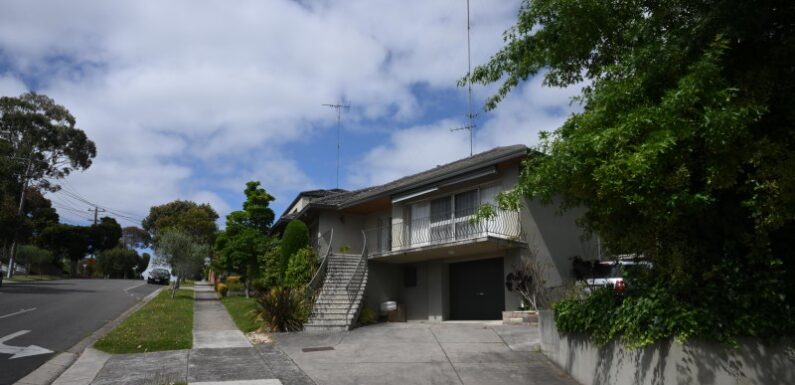
Save articles for later
Add articles to your saved list and come back to them any time.
Lower Templestowe’s designation as Lower long puzzled me, because on a map it seemed simply west of Templestowe. Was it Lower because I could just afford to live in it, but not in Templestowe itself, with its expansive plots of land that accommodate houses that have spawned other houses to contain their horses?
This terminological query was among many queries I had about Lower Templestowe when it was floated as a place to live. My love of Melbourne (having come from Sydney) rested on the allure of specialist croissant bakeries only accessible via trap doors – and I had for a time known such a life, in suburbs like Fitzroy and Coburg.
Lower but not lesser: the Ruffey Trail suspension bridge in Lower Templestowe.Credit: Eddie Jim
So my research on Lower Templestowe, which listed “shops, parks, buses, and schools” as its central features, did not immediately excite me. But I had recently had my first child, and I was persuaded that these were more sensible things to live near than bespoke pastrami shops with vintage pinball machines. Someplace quieter, too – I was in an intractable battle with the council over a 2am commercial rubbish-bin collection outside the bedroom window, my nerves shot from the screech of burnouts on Sydney Road.
It certainly is quieter in Lower Templestowe – if you are lucky enough to live on the side furthest from Bulleen, where currently sky-high scaffolding and sinkholes are the landscape, as the North-East Link build ploughs its way through.
You’re luckiest if you live far from that part but close enough to it to be able to make your way along the paths that run through Birrarung Park or Finns Reserve or the Ruffey Trail Walkway – drawcards for those who find solace in nature. I quickly became an amateur twitcher once settled here, annoying my family with shrieks of delight at the scores of cockatoos, galahs, lorikeets and wattlebirds.
These areas, long-cared for by their traditional owners, the Wurundjeri people, offer quiet walks among river red gums and wattle trees, with some good on-path and off-path biking options. Walk along the Yarra and you might spot the crepuscular platypuses frolicking in the rapids, or a wombat burrow near Wombat Bend, the park that became my saviour when my children were little. It offers a fully enclosed play space from which small people can’t escape, with picnic tables, sandpits, water play, a flying fox, a maze and more.
Though suburban, Lower Templestowe is, architecturally, far from uniform or neat. If it’s a LEGO land, it’s closest to a version built by children who have run out of LEGO and are also using their Sylvanian Families bits and bobs. None of the charming Victorian terraces of the northern suburbs, with their pretty silver gums, and picket fences.
Lower Templestowe’s houses are an eclectic offer, reflecting its culturally diverse mix, with the most recent census indicating the top five ancestries as Chinese, English, Australian, Italian and Greek. There are modernist gems, often recognisable by their textured brick, timber trimmings and exposed beams (the occasional Robin Boyd delight, built postwar using plans offered through The Age each week by the eminent architect, for example); Italianate mansions, with their signature dark-brick facades, white balustrades, and ornate balconies; and, increasingly, cookie-cutter townhouses that spring up overnight possibly composed of Clag and cardboard.
The hilly terrain of Lower Templestowe has also necessitated some Frankenstein-ian house layouts, in order to have a front door one can access without getting the bends. It’s not uncommon to find yourself in a home where a bedroom springs out from a living room that can be accessed only by a spiral staircase leading to a rumpus that has an outlook over a swimming pool 20,000 leagues under the sea.
Though the suburb offers only buses for public transport, for the most part they run frequently enough and offer reasonable access to other transport hubs – and if you can make it up a few near 90-degree on-road hills you can ride almost entirely off-road right into the city.
In the 13 years I have lived in Lower Templestowe, I’ve delighted in seeing even further growth of the array of shops offering delicacies from Persian, Indian, Chinese, Malaysian, Italian and Greek communities. It is also a suburb with a significant population over 60, which means that as well as the delicacies, you can easily find somewhere to tune your hearing aid, X-ray your lungs or oil your walking frame.
Lower Templestowe is close to some fantastic places (Heide Museum of Modern Art, in Bulleen; the delights of Eltham; and a trip to the city isn’t too difficult if you’ve got a car and it’s not peak hour) but I do miss being a stone’s throw from cafes, cinemas and bars. There are a couple of great bakeries and dining ventures here and there, but I implore more entrepreneurs to give this area a go – Wombat Bend, with its sleep-impoverished parents would be a winner for a coffee cart.
I guess Lower Templestowe is lower in those stakes (turns out it’s also Lower because it is downstream from Templestowe … I really do overthink things). In any case I’m going to start calling it Little Templestowe. Maybe it’ll catch on. Maybe it’ll get a Greenwich Village or Hampstead Heath vibe going. Maybe it’ll get us a jazz bar.
This piece is part of The Age’s Life in the ’Burbs series.
Nicola Redhouse is the author of Unlike the Heart: A Memoir of Brain and Mind
(UQP).
The Opinion newsletter is a weekly wrap of views that will challenge, champion and inform your own. Sign up here.
Most Viewed in National
From our partners
Source: Read Full Article
